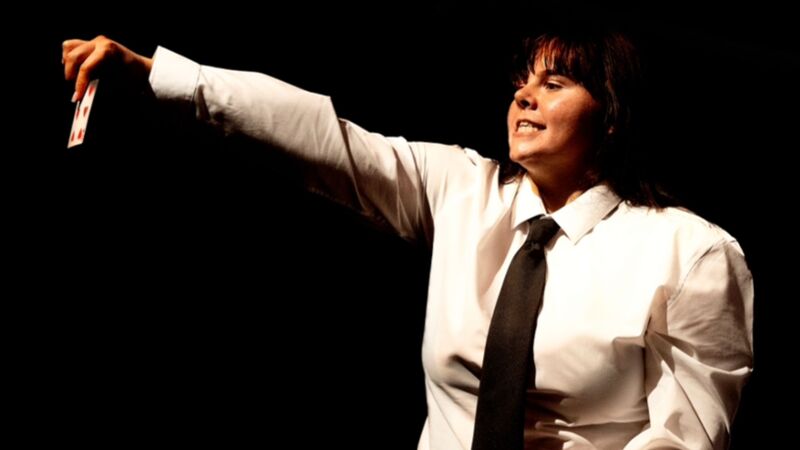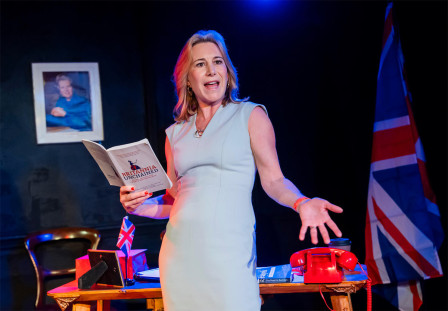Review: 384 DAYS, Pleasance
384 Days is a play that doesn’t just explore discomfort; it thrives on it. A one-woman show written by and starring Megan Ita O’Rourke as Molly O’Riordan, it boldly plants itself in the awkward, the vulnerable and the emotionally raw.
 384 Days production image.
384 Days production image.
Stepping onto a stage solo is no small feat, but stepping into the shoes of a woman held in a mental health unit, whilst performing for an audience cast as her 'review team’ who are deciding whether she’s ready for release, adds a whole new layer of tension and complexity. The play is directed and produced by Theo Collins, with Marayam Tuggar as assistant director and Issey Vogal as associate director. Together they navigate a complex web of themes including identity, loneliness, internet culture and the relentless pressure to appear ‘normal’. It opens with a disarming twist: a magic show which sets the tone with a bittersweet promise ‘tonight, we wipe away our tears’ which it promptly and deliberately breaks. The magic is more than metaphorical; it's a recurring motif, a coping mechanism, a crutch and at times it serves as a distraction. Molly performs sleight-of-hand as her emotional reality unravels before us. Not only are these tricks genuinely impressive (thanks to magic consultant Lev Govoroski), but they also serve a deeper purpose, acting as a buffer between heavier moments as well as a glimpse into Molly’s fragile mental escape routes.
Molly insists she’s not like ‘the others’ in the unit. She’s just ‘misunderstood’. She jokes that watching her will be like ‘watching paint dry’. However, we soon come to see that that couldn't be further from the truth. As we’re drawn further into her world, the lines between reality and illusion begin to blur. The story slowly, cleverly reveals glimpses of why she’s here without ever fully spelling it out. This is one of the play’s strengths, in that what’s left unsaid becomes just as powerful as what is spoken. Perhaps it could at times go a little deeper, its explorations of life in a mental health unit feeling a bit on the shallow side. However, what ultimately matters more is Molly’s unique experience and in that regard she is a nuanced, fully realised character. The script draws inspiration from the Irish myth of Cú Chulainn and Connla, a tragic tale of a father who unknowingly kills his son in battle. This mythological parallel adds a rich layer of meaning to Molly’s story, particularly as we learn that her psychiatric review coincides with her late father’s birthday. Their complex and unresolved relationship quietly haunts the play, shaping Molly’s guilt and fuelling her inner turmoil.
Like so many of us, Molly increasingly seeks purpose through the online world. She idolises YouTubers and influencers, aspiring to become one herself. However, as we know the internet is no safe haven or salvation. Instead, it becomes a breeding ground for self-doubt and manipulation, with anonymous voices nudging her toward darker thoughts and even darker deeds. O’Rourke’s performance is magnetic. She’s sharp, funny and unflinchingly honest. Her comedic timing lands effortlessly, providing relief without undermining the emotional weight of the piece. She doesn’t mock human fragility but instead she holds it up to examine it. The audience is invited to do the same. It might have added further depth to more fully explore Molly’s dependence on online validation and her aspirations to become an influencer. She recalls how a single negative comment from a peer derailed her ambition in an incident that highlights just how fragile and externally shaped her sense of self has become. By the end of the play, we see her miming a YouTube video for imaginary fans, a haunting image that underscores the blurred line between performance and reality. This is a timely and resonant topic, but while the play merely gestures toward it, a more thorough unpacking of this dependence could have sharpened the emotional stakes and offered an even more layered understanding of Molly’s vulnerability in a hyper-connected world.
The staging is striking in its simplicity. Faith To’s minimalist set, a blank white room with a crudely drawn door and window, evokes an extreme sense of confinement. There is no real exit, only the illusion of one. Geneve Cho’s projections, featuring animations by Ella Corrieri, include glimpses of Molly’s laptop screen and the bizarre world of wellness influencers, adding another meaningful layer of commentary. These visual cues smartly reflect the inner noise of Molly’s mind, expose her yearning for connection and her spiralling. Grace BM’s movement direction is also brilliant. Molly is subtle yet incredibly expressive and this translates her internal chaos into physical expression. Finally, though we only hear her voice, Niamh Drumgoole’s Nurse Eileen adds a quietly powerful presence as the unseen observer, a symbol of institutional authority and distance.
What makes 384 Days so affecting is how deeply it mirrors our own vulnerabilities. It speaks to the pressure we all face to get it together, constantly performing the task of juggling mental health, relationships, careers and even sometimes grief. Can anyone really do it all? The play asks us not only to witness Molly’s struggle but to reflect on how we might fare in her shoes. Audience involvement is a clever device in this respect. The audience is directly addressed, even sometimes brought on stage. It serves to implicate us in the process because it makes us more than just spectators. We are part of the judgment, part of the system deciding Molly’s fate. It’s an unsettling but effective technique. Ultimately, 384 Days is a deeply moving production that necessarily stirs a range of emotions. You’ll laugh, you may cry - but no matter what, you’ll certainly leave the theatre feeling something new. Ambitious and emotionally layered, this is a bold and intelligent piece of theatre that challenges assumptions, invites compassion and quietly reminds us of the fragility we all share.
384 Days played at the London's Pleasance Theatre until 16 October.
Latest News

 The 2026 Olivier Award-nominated shows to see in London this year
5 March 2026 at 17:49
The 2026 Olivier Award-nominated shows to see in London this year
5 March 2026 at 17:49

 Nominations announced for the Olivier Awards 2026
5 March 2026 at 13:00
Nominations announced for the Olivier Awards 2026
5 March 2026 at 13:00

 Review: THE LAST DAYS OF LIZ TRUSS at The Other Palace
5 March 2026 at 10:57
Review: THE LAST DAYS OF LIZ TRUSS at The Other Palace
5 March 2026 at 10:57

 New children announced for West End production of MATILDA THE MUSICAL
5 March 2026 at 10:00
New children announced for West End production of MATILDA THE MUSICAL
5 March 2026 at 10:00
